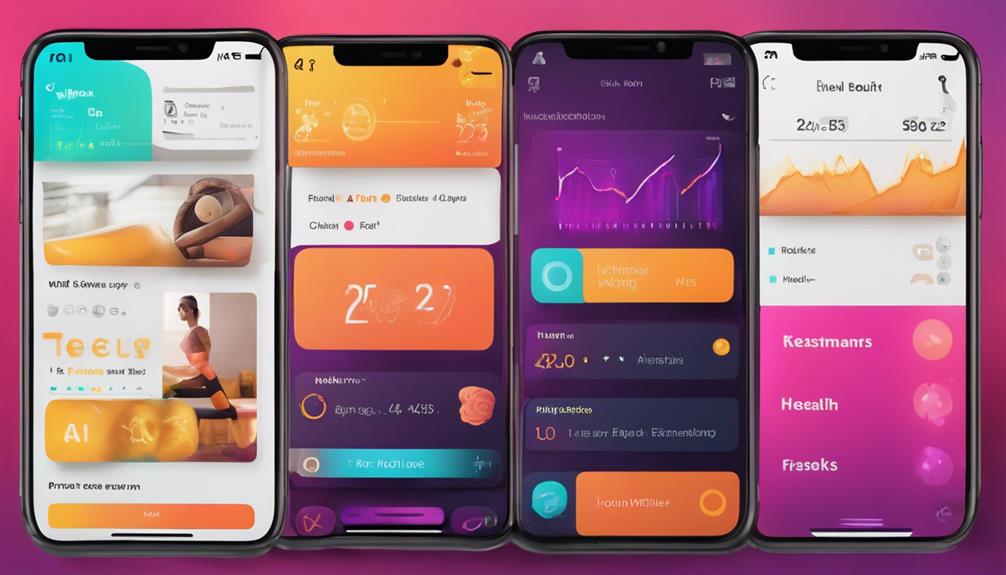Imagine a scenario where a virtual assistant helps a patient schedule follow-up appointments, reminds them of medication timings, and provides personalized health tips. This level of support not only enhances patient engagement but also frees up healthcare professionals to focus on delivering quality care. As you explore the numerous benefits of incorporating virtual assistants in healthcare, you will uncover innovative ways these digital aids are transforming the industry and shaping the future of patient-centric care.
Improved Patient Experience
Utilizing virtual assistants in healthcare has led to a noticeable enhancement in the overall patient experience, as evidenced by an increase in satisfaction rates and streamlined communication processes. Patient feedback regarding the use of virtual assistants has been overwhelmingly positive. Patients have reported feeling more supported and informed throughout their healthcare journey, attributing this to the seamless integration of technology in their care.
The integration of virtual assistants has significantly improved communication between patients and healthcare providers. Patients can now easily schedule appointments, receive medication reminders, and access personalized health information with just a few clicks. This technology integration has not only increased patient engagement but has also led to higher levels of patient satisfaction.
Furthermore, virtual assistants have proven to be invaluable in providing timely responses to patient inquiries and concerns. This quick and efficient communication channel has resulted in improved patient outcomes and overall experience. In conclusion, the implementation of virtual assistants in healthcare has undeniably revolutionized the patient experience through enhanced communication and technology integration.
Cost Savings for Providers
By utilizing virtual assistants in healthcare, providers can achieve significant cost savings through reduced administrative expenses, lower overhead costs, and increased financial efficiency. These virtual assistants streamline various tasks, such as scheduling appointments, managing paperwork, and handling billing processes, ultimately leading to more cost-effective operations for healthcare providers. The data-driven approach of virtual assistants ensures accurate and timely completion of administrative duties, contributing to overall financial savings for healthcare facilities.
Reduced Administrative Expenses
Reducing administrative expenses through the integration of virtual assistants in healthcare operations can lead to significant cost savings for providers. By leveraging virtual assistants, providers can improve staff productivity and enhance time management. Virtual assistants streamline tasks such as appointment scheduling, data entry, and billing, allowing staff to focus on higher-value activities. This optimization of staff productivity results in more efficient operations, ultimately reducing administrative costs.
In a study by the American Medical Association, it was found that integrating virtual assistants in healthcare settings saved providers an average of 16% in administrative costs. This reduction in expenses can have a substantial impact on a provider’s bottom line. Virtual assistants not only improve the efficiency of administrative tasks but also contribute to enhancing overall operational effectiveness.
Lower Overhead Costs
How can virtual assistants in healthcare contribute to lowering overhead costs for providers? By utilizing virtual assistants, providers can significantly reduce their overhead costs through efficient methods such as remote monitoring and virtual consultations. Here’s how virtual assistants help in cutting down overhead expenses:
- Remote Monitoring: Virtual assistants can assist in monitoring patients remotely, reducing the need for in-person visits and lowering associated costs like staff wages and facility maintenance.
- Virtual Consultations: Conducting virtual consultations through virtual assistants can save on physical space requirements and utility expenses, ultimately reducing overhead costs for providers.
- Streamlined Administrative Tasks: Virtual assistants can handle administrative tasks efficiently, reducing the need for additional administrative staff and saving on salaries and benefits.
- Enhanced Patient Care: By leveraging virtual assistants for tasks like appointment scheduling and patient follow-ups, providers can improve patient satisfaction and retention, leading to long-term cost savings through increased patient loyalty.
Increased Financial Efficiency
Utilizing virtual assistants in healthcare can lead to increased financial efficiency for providers through streamlined operations and optimized resource allocation. Virtual assistants offer remote support, enabling healthcare providers to access administrative assistance without the need for physical office space or additional on-site staff. By leveraging virtual assistants for tasks like appointment scheduling, patient communication, and billing support, healthcare organizations can reduce operational costs associated with traditional in-person administrative roles.
Financial optimization is a key benefit of integrating virtual assistants into healthcare settings. These digital aides allow providers to scale their administrative support based on fluctuating demands, avoiding the need for full-time employees for tasks that can be efficiently handled remotely. This flexibility not only reduces fixed labor costs but also ensures that resources are allocated effectively, improving overall financial performance.
Tailored Patient Care Plans
Virtual assistants in healthcare offer the advantage of Personalized Care Management, tailoring patient care plans to individuals’ specific needs and preferences. By providing Customized Treatment Strategies, these assistants can optimize healthcare outcomes by aligning treatment plans with patient characteristics and medical history. Moreover, the ability to create Individualized Wellness Programs empowers patients to actively participate in their health management, leading to improved engagement and adherence to treatment regimens.
Personalized Care Management
Personalized care management in healthcare involves tailoring patient care plans to individual needs, optimizing treatment outcomes and patient satisfaction. By leveraging virtual assistants, healthcare providers can enhance this process through remote patient engagement and efficient care coordination. Here’s how personalized care management benefits from virtual assistants:
- Improved Patient Outcomes: Virtual assistants help in personal health tracking, enabling healthcare professionals to monitor patient progress closely and adjust care plans promptly.
- Enhanced Chronic Disease Management: Through continuous monitoring and reminders, virtual assistants aid in managing chronic conditions effectively, improving patient adherence to treatment regimens.
- Increased Patient Engagement: Virtual assistants facilitate remote patient engagement by providing timely reminders, educational resources, and interactive communication, fostering a stronger patient-provider relationship.
- Streamlined Care Coordination: With virtual assistants, care coordination becomes more efficient as they assist in scheduling appointments, sending medication reminders, and facilitating seamless communication among healthcare team members.
Customized Treatment Strategies
Tailored patient care plans, customized to individual needs, play a crucial role in optimizing treatment outcomes and enhancing patient satisfaction in healthcare. By implementing personalized interventions based on specific patient characteristics, healthcare providers can significantly improve the effectiveness of treatments. Studies have shown that customized treatment strategies lead to better patient outcomes, reduced hospital readmissions, and overall cost savings in the long run.
Patient engagement is a key component of implementing customized treatment strategies successfully. When patients are actively involved in the decision-making process regarding their care plans, they are more likely to adhere to treatment regimens and see improved results. Virtual assistants can play a vital role in facilitating patient engagement by providing personalized reminders, educational resources, and continuous support throughout the treatment journey.
Incorporating customized treatment strategies not only enhances the quality of care but also fosters a sense of empowerment and trust between patients and healthcare providers. By tailoring care plans to individual needs and promoting patient engagement, healthcare organizations can achieve better treatment outcomes and ultimately improve patient satisfaction levels.
Individualized Wellness Programs
Implementing customized wellness programs based on individual patient needs is crucial for optimizing treatment outcomes and improving patient satisfaction in healthcare. By tailoring patient care plans to specific requirements, healthcare providers can enhance the overall effectiveness of treatment and ensure a more personalized approach to patient well-being. Two key components of individualized wellness programs are personalized nutrition and fitness tracking. These elements allow for a targeted focus on each patient’s dietary requirements and physical activity levels, leading to better health management and improved outcomes. Additionally, leveraging technology within these programs can facilitate remote monitoring and real-time feedback, enhancing patient engagement and adherence to treatment plans. By integrating personalized nutrition and fitness tracking into individualized wellness programs, healthcare providers can empower patients to take an active role in their health management, leading to better long-term health outcomes and increased patient satisfaction.
Streamlined Health Information Access
Efficiently accessing health information is crucial in the healthcare setting to ensure timely and accurate decision-making. Virtual assistants play a significant role in streamlining this process by providing quick access to remote monitoring data and digital records.
Remote monitoring allows healthcare providers to track patient data in real-time, enabling proactive interventions and personalized care plans. Through virtual assistants, healthcare professionals can remotely access vital signs, medication adherence, and other significant health metrics, facilitating prompt decision-making based on the latest information.
Digital records, integrated with virtual assistant platforms, centralize patient information, ensuring quick retrieval of medical histories, test results, and treatment plans. This streamlined access to comprehensive patient data enhances efficiency during consultations, reducing time spent searching for relevant information and enabling healthcare providers to focus more on patient care.
Continuous Health Monitoring
Virtual assistants in healthcare not only streamline access to health information but also contribute significantly to continuous health monitoring through real-time data tracking and personalized care interventions. By employing remote monitoring technologies, virtual assistants play a crucial role in keeping track of patients’ health status beyond traditional healthcare settings. Through continuous data analysis, these virtual assistants can provide timely insights and alerts to both patients and healthcare providers, enhancing the overall quality of care delivery. Here are four key ways virtual assistants support continuous health monitoring:
- Real-time Data Tracking: Virtual assistants collect and analyze real-time health data, allowing for immediate detection of any anomalies or concerning trends.
- Personalized Care Interventions: Through data analysis, virtual assistants can offer personalized recommendations and interventions tailored to individual health needs.
- Proactive Health Management: By monitoring health metrics continuously, virtual assistants enable proactive management of chronic conditions and early intervention when necessary.
- Enhanced Patient Engagement: Virtual assistants promote patient engagement by providing regular feedback and reminders for health-related activities, fostering a more active role in self-care.
Effortless Appointment Management
Effortless appointment management through virtual assistants in healthcare offers a streamlined scheduling process, allowing for efficient allocation of resources and staff. By utilizing these tools, healthcare providers can enhance patient communication and engagement, leading to improved overall patient satisfaction and outcomes. The data-driven approach of virtual assistants ensures accuracy in scheduling, reducing errors and optimizing the utilization of healthcare facilities.
Streamlined Scheduling Process
Enhancing the healthcare system’s efficiency, the utilization of virtual assistants has revolutionized the appointment scheduling process, making it smoother and more organized for both healthcare providers and patients. Virtual assistants offer benefits like time optimization, improved efficiency, enhanced organization, and seamless coordination.
- Time Optimization: Virtual assistants can efficiently manage appointment schedules, reducing wait times and ensuring optimal utilization of healthcare providers’ time.
- Improved Efficiency: By automating reminders and follow-ups, virtual assistants help in reducing no-shows, maximizing the number of appointments, and enhancing overall operational efficiency.
- Enhanced Organization: Virtual assistants keep track of appointments, patient information, and medical records in a structured manner, aiding in a more organized workflow for healthcare providers.
- Seamless Coordination: These assistants facilitate seamless communication between patients and healthcare providers, ensuring appointments are scheduled promptly and any changes are communicated effectively.
The streamlined scheduling process enabled by virtual assistants not only benefits healthcare providers by optimizing their time and improving efficiency but also enhances the overall patient experience through better organization and coordination.
Improved Patient Communication
Improving patient communication in healthcare, particularly in managing appointments, is a critical aspect influenced by the use of virtual assistants. Virtual assistants enhance patient engagement by offering seamless appointment scheduling and reminders. Through automated messages and interactive voice response systems, patients can efficiently book, reschedule, or cancel appointments, reducing no-show rates. This streamlined process not only benefits patients but also optimizes the healthcare provider’s schedule, ensuring maximum productivity.
Moreover, virtual assistants play a vital role in telemedicine integration, facilitating communication between patients and healthcare professionals. Patients can receive timely updates, medication reminders, and even access telehealth services through these platforms. This level of connectivity enhances patient satisfaction and overall health outcomes.
Enhanced Medication Adherence
Utilizing virtual assistants in healthcare has shown to significantly boost patients’ adherence to medication regimens, leading to improved health outcomes and reduced healthcare costs. Virtual assistants provide a personalized approach to medication management, offering reminders and support tailored to individual needs. Here are four key ways virtual assistants enhance medication adherence:
- Remote Patient Monitoring: Virtual assistants enable healthcare providers to remotely monitor patients’ medication adherence, allowing for timely interventions when issues arise.
- Personalized Reminders: Through virtual medication assistance, patients receive customized reminders for medication intake, reducing the likelihood of missed doses.
- Virtual Medication Assistance: Virtual assistants can answer medication-related queries, provide information on drug interactions, and offer guidance on proper usage.
- Wellness Check-Ins: Virtual assistants conduct regular wellness check-ins, ensuring patients are following their prescribed medication regimens and addressing any concerns promptly.
Expanded Telehealth Options
Expanded telehealth options have revolutionized healthcare delivery by bridging the gap between patients and healthcare providers, offering convenient and efficient virtual care solutions. Remote consultations are now readily accessible, allowing patients to connect with healthcare professionals remotely, reducing the need for in-person visits. Virtual prescriptions can be issued electronically, streamlining the process of medication management and enhancing medication adherence.
Moreover, digital diagnostics play a crucial role in telehealth, enabling healthcare providers to remotely monitor patients’ vital signs and health data. Telehealth technology has advanced significantly, with innovative tools and platforms that facilitate seamless virtual interactions between patients and healthcare professionals. These technologies not only improve access to care but also enhance the overall patient experience by providing timely and convenient healthcare services.
Robust Patient Data Protection
With the increasing integration of telehealth options in healthcare, ensuring robust patient data protection has become paramount to safeguard sensitive medical information in virtual environments. Data encryption and cybersecurity measures play a crucial role in maintaining the confidentiality and integrity of patient data. Here are key aspects to consider:
- End-to-End Encryption: Implementing robust encryption protocols ensures that data is securely transmitted and stored, preventing unauthorized access.
- Multi-Factor Authentication: Utilizing multi-factor authentication adds an extra layer of security, requiring users to provide multiple forms of verification before accessing patient data.
- Regular Security Audits: Conducting routine security audits helps identify vulnerabilities and ensures compliance with data protection regulations, strengthening overall cybersecurity measures.
- Employee Training: Providing comprehensive training to staff on data security best practices and protocols is essential in preventing data breaches and maintaining a secure virtual environment for patient information.
Direct Doctor-Patient Communication
Direct doctor-patient communication plays a pivotal role in enhancing healthcare delivery and improving patient outcomes. With the rise of remote consultations and virtual visits, effective communication between doctors and patients has become more important than ever. Virtual visits allow patients to connect with their healthcare providers from the comfort of their homes, improving healthcare accessibility for individuals in remote areas or those with mobility limitations. These remote consultations not only save time and reduce travel costs for patients but also enable quicker access to medical advice and treatment.
Patient engagement is crucial for successful healthcare outcomes, and direct doctor-patient communication fosters this engagement. By utilizing virtual assistants to facilitate these interactions, patients can receive personalized care and feel more involved in their treatment plans. Studies have shown that increased patient engagement leads to better adherence to treatment regimens and improved health outcomes overall. Therefore, leveraging virtual assistants for direct doctor-patient communication can significantly enhance the quality of healthcare delivery and patient satisfaction.
Frequently Asked Questions
Can Virtual Assistants Assist With Medical Billing and Insurance Claims?
Wondering if virtual assistants handle medical billing and insurance claims? Absolutely! With telehealth services expanding, automation streamlines processes. Electronic health records integration ensures accuracy. Let virtual assistants lighten your workload efficiently.
How Do Virtual Assistants Ensure Patient Confidentiality and Data Security?
To ensure patient confidentiality, virtual assistants use encryption for secure data transmission. They maintain data security through HIPAA compliance, safeguarding sensitive information. Your healthcare data is protected, ensuring privacy and confidentiality.
Are Virtual Assistants Capable of Managing Multiple Languages for Diverse Patients?
If you’re wondering about virtual assistants and multiple languages, rest assured. These assistants can manage various languages, thanks to their language translation capabilities and cultural competency training. They ensure effective communication for diverse patients.
Can Virtual Assistants Handle Scheduling for Complex Medical Procedures?
Yes, virtual assistants are adept at handling procedure coordination and patient communication. They streamline administrative tasks, optimizing appointment scheduling for complex medical procedures. Their efficiency benefits both healthcare providers and patients by ensuring smooth and effective care.
How Do Virtual Assistants Integrate With Existing Healthcare Systems and Software?
Integrating virtual assistants with healthcare systems involves optimizing workflows and ensuring smooth system integration. Enhancing user experience is key, and though training requirements may seem daunting, the benefits far outweigh the initial investment.



